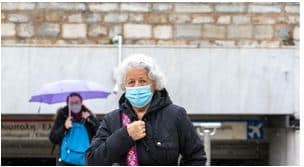
Hyderabad: Sars-Cov-2 virus samples have been found in the hospital air of Covid-19 wards but not in non-Covid 19 wards, according to a CSIR-Centre for Cellular and Molecular Biology study. Three hospitals each from Hyderabad and Chandigarh participated in the study.
In the study, researchers found the virus in infectious aerosols measuring the size of less than 5µm. The smaller sized aerosols could get formed due to evaporation of water from larger respiratory droplets. Scientists from CCMB state that the smaller sized aerosols could stay suspended in air for longer durations of more than 2hours and were found to travel longer distances of 2meters.
Dr Dr Rakesh Mishra, director of CCMB says, “Our research from hospitals has raised questions as to whether the distance travelled by the virus of 1 or 2 meters is safe or not. There is emerging evidence indicative of the possibility of air-borne transmission of SARS-Cov2. Although the statistics of air borne transmission of SARS-CoV-2 is not clear yet, the virus is detected in the air for prolonged durations in certain circumstances.”
At Covid-19 wards where the patients were treated, it was found that more number of patients meant generation of more virus particles. The walking, talking and moving patients left the virus particles in the air.
When the patients were seated for testing and evaluation purposes, it was noted that the virus was present to a distance of two metres.
CCMB scientists, while taking the air samples, carried out live human experiments where volunteers were made to sit in personal protection kits to check if there were viruses around them. They found samples of viruses in the air.
The hospitals that have participated in the study were from government and private sector but they do not have the infection control methods of negative air-pressure. The data generated from CCMB is being given to hospitals to understand the manner in which the virus circulated in the hospital air.
Teams of healthcare staff working in Covid-19 wards need to be very cautious. In the walking area and in the changing rooms of patients as also during evaluations and counseling, there is the risk of transmission of virus. The transmission can occur while breathing and talking too.
In Indian environment, within air-conditioned rooms, the virus particles are found to be alive for more than two hours in some cases.
In asymptomatic cases, the virus will not travel much until and unless the person is sitting in an air-conditioned room. In such a room, the breathing, talking and laughing of the person can emit viruses and these can move in the air.
In an open area where there are windows and good ventilation system, the virus cannot live in the air for a longer period of time, it was found.
The samples were collected from air using an air sampler and the data was compiled and researched by the CSIR-Institute of Microbial Technology (IMTech).
Scientists carried out RT-PCR tests on the air samples and they have tested multiple times to confirm presence of the virus.
The decision of hospitals to separate Covid-19 and non-Covid- 19 wards has benefited them. Preventive guidelines of hygiene like regular hand-wash and effective use of masks will help in prevention. Detecting and isolating positive cases early is the essential key to stop the spread.
























